Sometimes we need to know if it’s the bad USB port or the bad USB wire, or whether something is going wrong with our device.
Before declaring your device the bad one. It is really useful to first check if it’s the USB port that is causing the problem or if it’s the USB cable that is acting naughty.
There are so many ways you can test your USB port and cable. But a preferred way to check if your USB port is working the way it is supposed to be is by using one of the best USB testers out there on the market.
People use different words for this device, i.e. people often call it USB voltage tester, USB power meter, or USB multimeter. You are free to use any name you like, the functionality is the same.
Any best USB meter should be capable of checking the voltages across the USB port, current from the port to load, and should give you the charge storage capacity measure in mAh. These are the basic quantities but USB meters are not limited to these. You can have a meter with time measuring capability as well.
Here in this post, I try my knowledge best to help you find out the best USB testers no matter if you are a beginner, hobbyist, student, or professional. Please keep in mind, that my emphasis will be on high-quality USB testers.
Hopefully, this post will help you and you will enjoy it.
Choosing the right USB tester to test USB Ports and Cables
USB tester is a simple tool. There is not that much to look for in it to get it right. But here are my general key points that you should keep in mind while deciding which meter is the best USB tester. Of course, I will apply these things to all the models that you will see in this post later on.
a. Easy Operations
Operation is the key to the USB meter. Fancy operating systems and fancy looks will compromise the accuracy of results until you want to pay a high price for a decent one.
Any USB multimeter should have a very easy operation, i.e. you connect or plug it into the USB port and in a matter of seconds, you see the required results. That’s set. There is no need for the mode selection process, no need to press buttons to get to other parameters.
b. Friendly UI
By friendly UI (user interface) I mean everything should be very clear and bold. You know a lot of USB testers try to look fancy so that they can trigger buyers’ psychology. But in reality, keeping the performance in mind, there is no need for any fancy things or colors.
So your selection of the best USB tester should be like this: it has a clear big display with big bold readings that you can note from any angle and in any light.
c. Decent refresh rate
Refresh rate is the time the USB meter takes to refresh its readings on the display. It should be very very low like in milli seconds or ideally in micro-seconds.
d. Safety features i.e. over current/voltage protection
It is important to see what is the output at the USB port so that you can assure the safety of our connecting device. By safety, I mean how much voltage our connecting device safely bears or how much current it can draw from the source.
Your USB meter should be capable of bearing these voltages themselves first. Like if the voltages go beyond the rating of the USB tester. The USB tester must automatically turn itself off to protect itself from burning down. The same goes for the case of overcurrent flow.
e. Bi-directly current flow support (totally optional)
As the name suggests the current can flow in both directions in such USB testers. What this means is like no matter you are taking the USB output port or input port both can act as input or output.
The port doesn’t matter at all. What matters is that the USB meter will automatically show you from which port current is flowing to which port. It may be confusing at the beginning so that is why I am making it optional.
f. Industry standard Voltage and Current ratings
Like it will not make any sense if you buy a meter that has voltage and current ratings of no use. The industry standard rating for any USB port are the following:
- Signal: 5V (DC)
- Max Voltage (DC): 5.25 V (USB 1.0 to 3.1) 5.50 V (USB 2.0) 6.50 V (USB BC 1.1) 6.00 V (USB BC 1.2) 21.50 V (USB PD to 2.0) 50.90 V (USB PD 3.1)
- Max Current (DC): 0.5 A (USB 2.0) 0.9 A (USB 3.0) 1.5 A (USB BC 1.2) 3.0 A (USB-C) 5.0 A (USB PD)
List of amazing best USB testers
I think I have shared all the information that I have about how to select the best USB tester. Now let have look at some USB testers.
1. PowerJive USB meter
Staring our list with very clean and basic USB meter i.e. PowerJive USB meter. It has options for current, voltage, and capacity measurements with amazing accuracy of 1%.
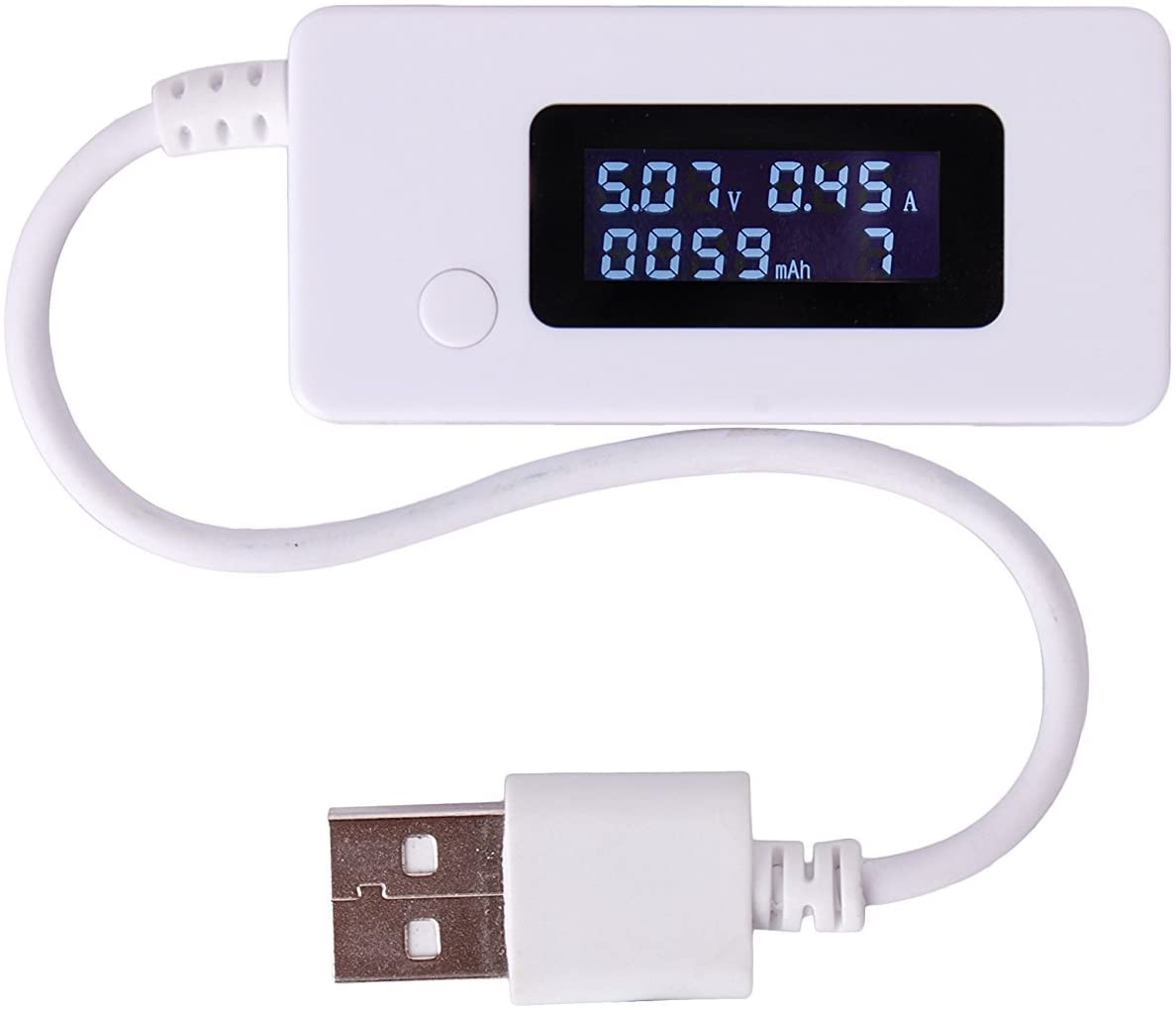
Important features:
- Best for troubleshooting charging adapters and cables
- Decent voltage (3 – 15V, DC) and current (0.05 – 3.5A, DC) ratings
- Amazing voltage resolution of 0.01V
- Protection feature for your connected devices.
If this meter has got your attention. Here is the link, PowerJive USB tester (Amazon Link), to find out more about it. The best part is, it is bi-directional and has a very low price tag.
2. Plugable USB C Tester
USB C is the future of USB connections. Because this type of USB is giving so much data transfer with hassle-free connections.
So if you have modern devices then chances are they are using USB Type C ports. To test those you need this “Plugable USB C tester”.
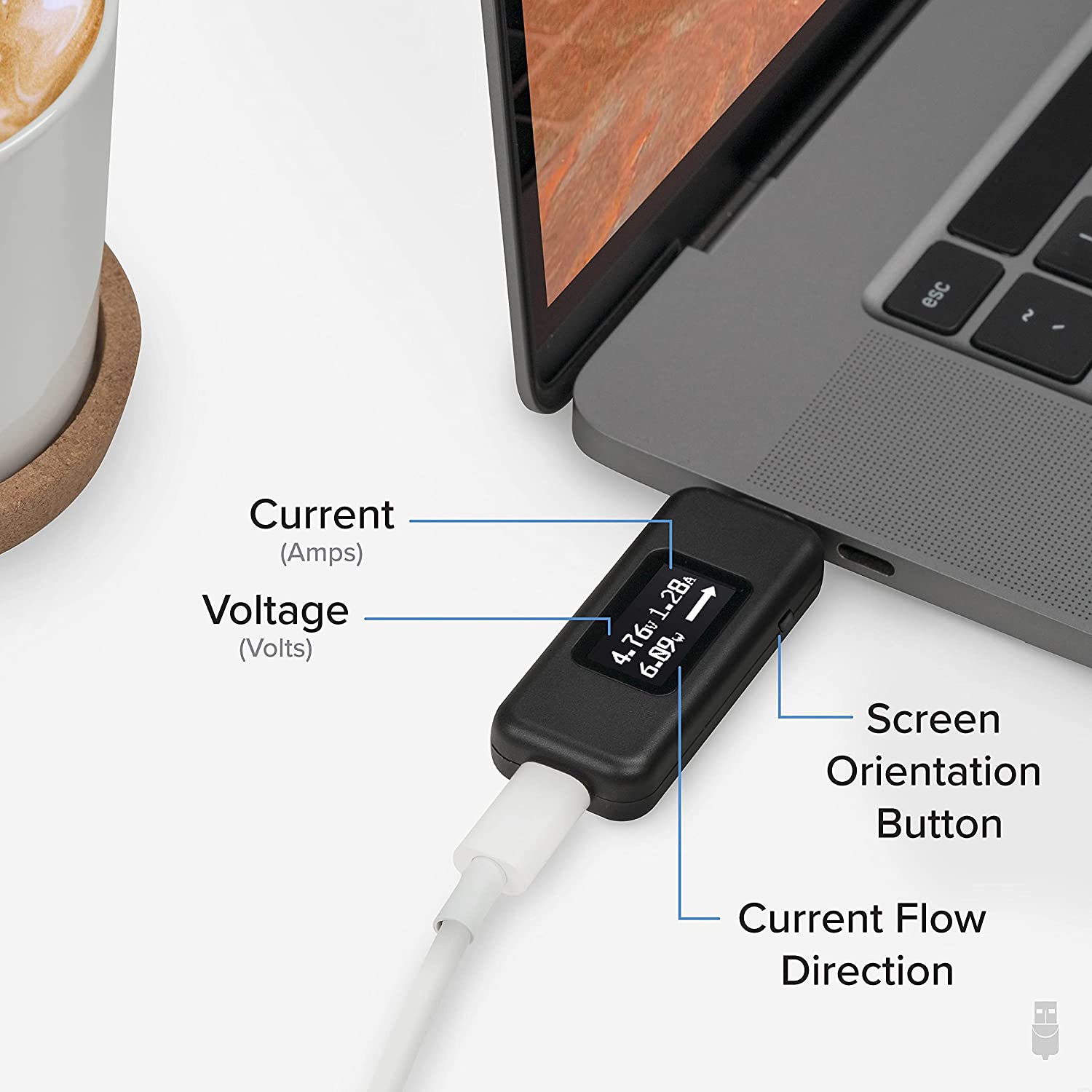
If you focus on the above picture which shows the current direction which is a very useful feature to have. The amazing part of this tester is, it comes with a 2-years warranty.
So if this guy got your attention. Then there is the link, USB C Tester (Amazon link), to follow for your own further queries and research.
3. Klien Tools ET920
Klien Tools is a very famous US manufacturer. They are making high-quality electrical instruments for decades. The USB tester from this brand is a little pricy but it has options for USB A and C ports testing.
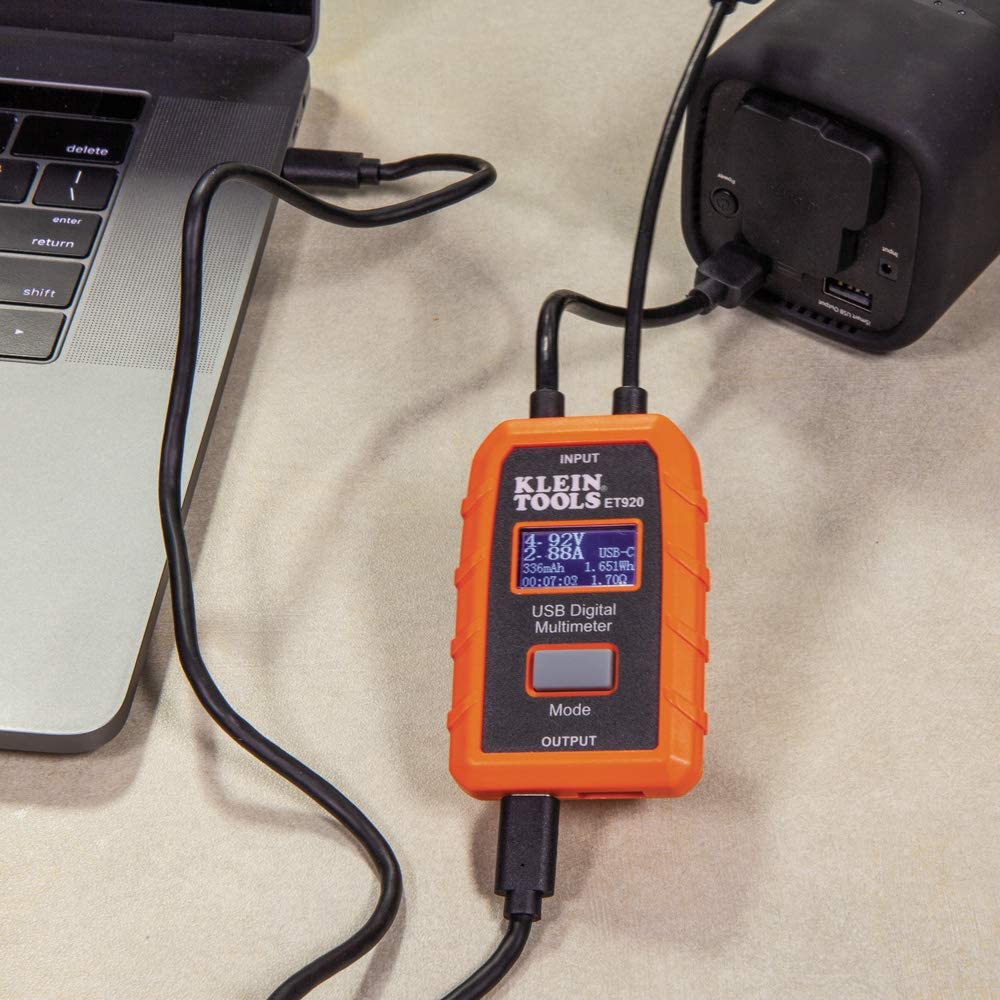
Important features of this best USB meter:
- You can test both ports USB A, and C types.
- High quality.
- Measures voltage, 3 to 20V DC
- Measures current, for USB A 0.05 to 3A, and for USB C 0.05 to 5A
- Accuracy of 1%.
- Best for monitoring ports for up to 1000hrs which is just amazing.
- Reading storing option.
- Very easy to operate.
- It has overvoltage and overcurrent protection, so it assures safety for your connecting devices.
- It also includes Qualcomm Quick Charge ports
- It is lightweight, and requires no external batteries to work.
If this guy is what you need then I highly recommend it. Here is the link, ET920 (Amazon link), for your own further consideration.
4. UT658 USB Tester
The alternative to the above ET920 from Klien Tools is this USB tester i.e. UT658. The difference is: it is a lot cheaper than the above one.
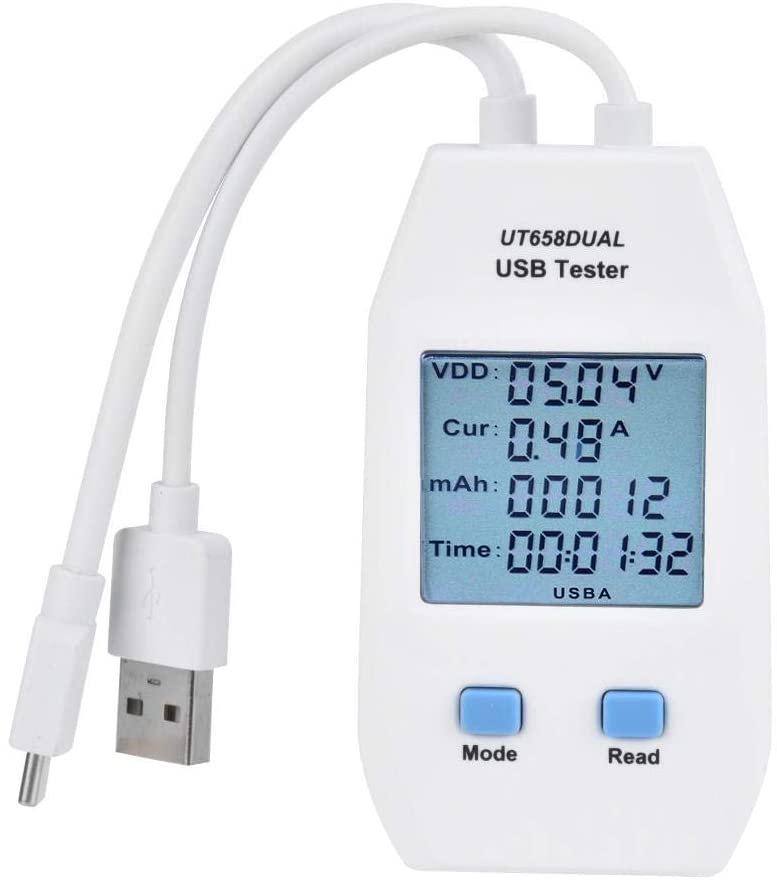
Most of you may agree with me on that this model is good looking than the above one. But we don’t care about how a device looks we are more interested in how a device can perform well.
And the performance of this meter is amazing. It has a very large display with big bold readings. The accuracy is fantastic and the best part is, it has a built-in protection system that protects your devices in overcurrent and overvoltage situations.
To know more about this USB meter. Here is the link to follow, UT658 USB Tester (Amazon link).
5. Eversame USB digital tester
The alternative to the above ET920 is this guy from the Eversame brand. This model is 2 in 2 i.e. it has USB A as well as Type C options, giving you the power to test whatever port you want to test proving it is a USB port.
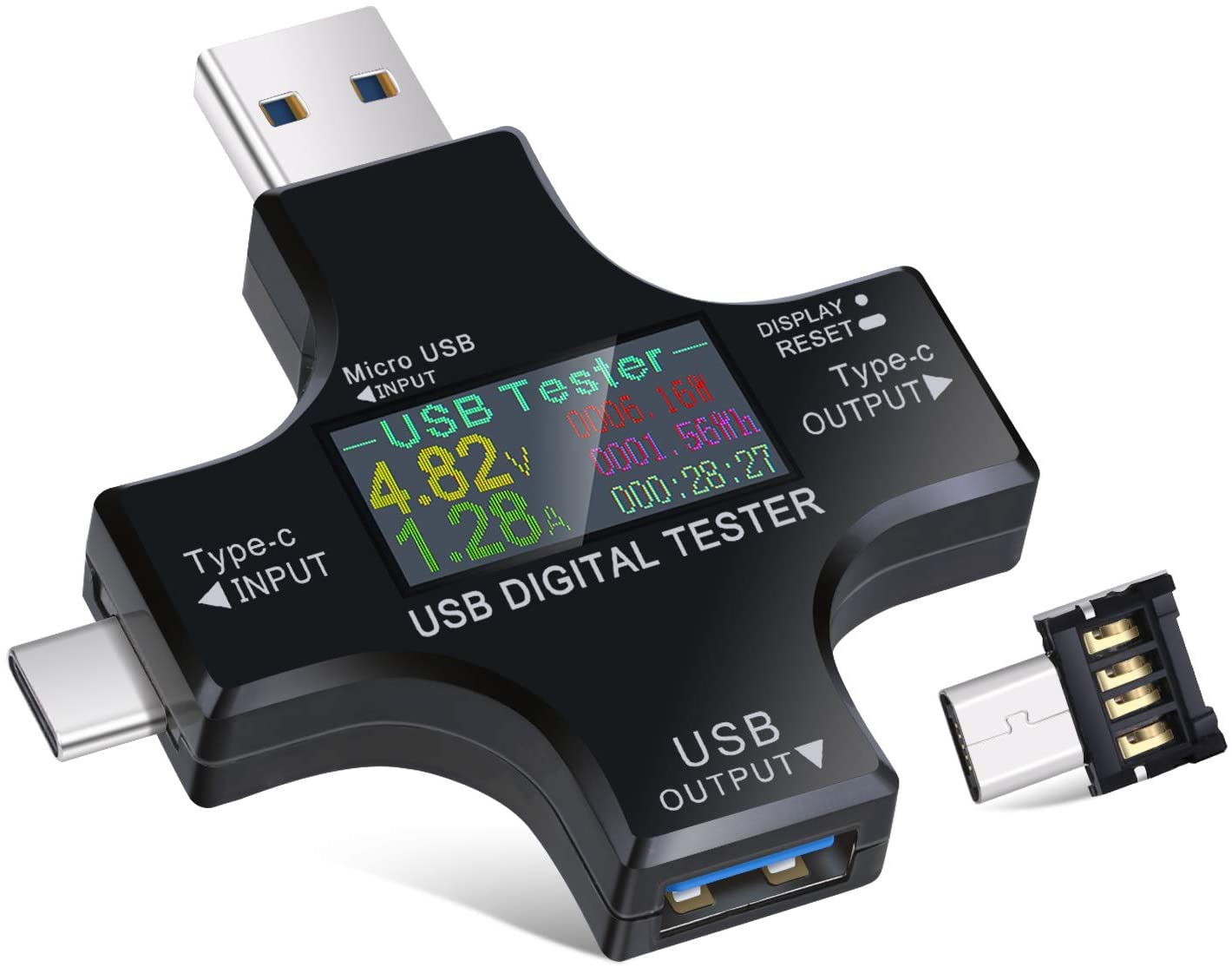
Important features:
- Measure voltage: 3.6-30V (DC), this is way more than the ET920 mentioned above
- Measures current: 0-5.1A (DC), these ranges are for both USB types
- This guy has over-voltage protection, over-current protection, under-voltage protection, low energy protection, and an alarm system. Damn pretty cool.
- The display has multiple colors, making it easy to distinguish different measurements.
- It is plug and play, no need for extra wires.
- It is portable, you can carry it anywhere.
- You can monitor your iPhone, galaxy whatever you want. It has covered your back for a wide range of applications.
In summary, the Eversame USB meter (Product link) is the best USB meter with lots of features. It is amazing and can do the job pretty well. It can measure the capacity of your mobile battery, or charger bank, as well as the speed of charging.
6. AT35 USB 3.0 Tester
For those people who want to test or measure USB type 3.0 ports then the RD AT35 has got everything for you. This tester is the easiest to use.
It got load impedance calculations, a voltage range of 3.7-30V, a current range of 0-4A with a fantastic resolution of 0.001V and 0.0001A, and an amazing refresh rate of 0.5Hz.
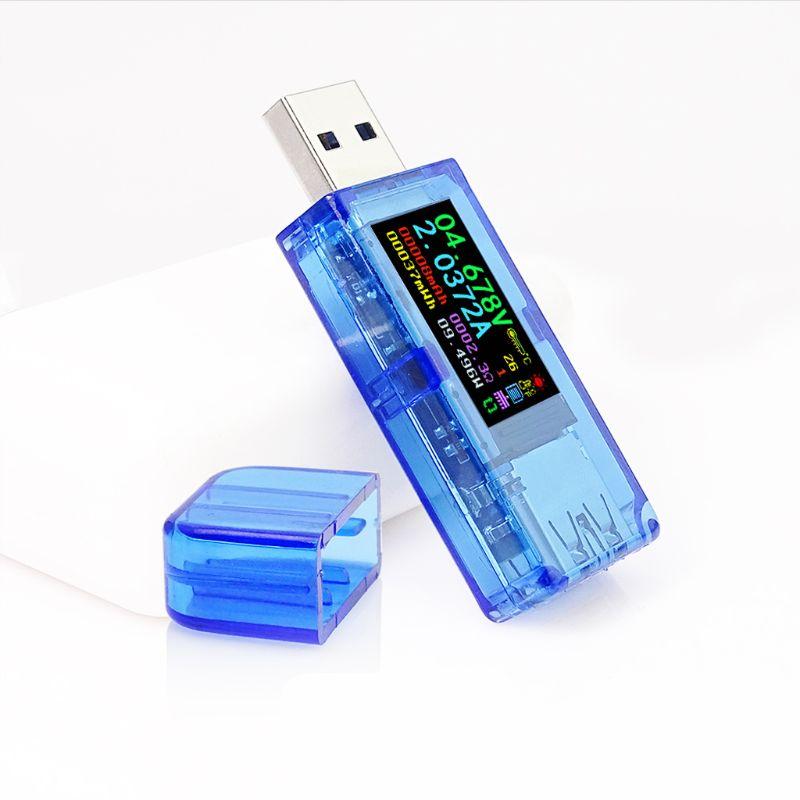
Trust me this guy is more than you think for such a low price. Use it for testing USB cables, checking your power bank capacity, voltage, and current ratings, and so much more.
Now if this best USB tester has got your attention. Then here is the link to follow for your further research, AT35 (Amazon link).
7. Drok 300043 USB multimeter
Droke is a very famous electronics brand with a huge customer base. The USB tester of Droke i.e. 300043 is amazing and the best part of it that differentiates it from the rest is: It has two outputs. This means you can monitor two devices at the same time using one meter.
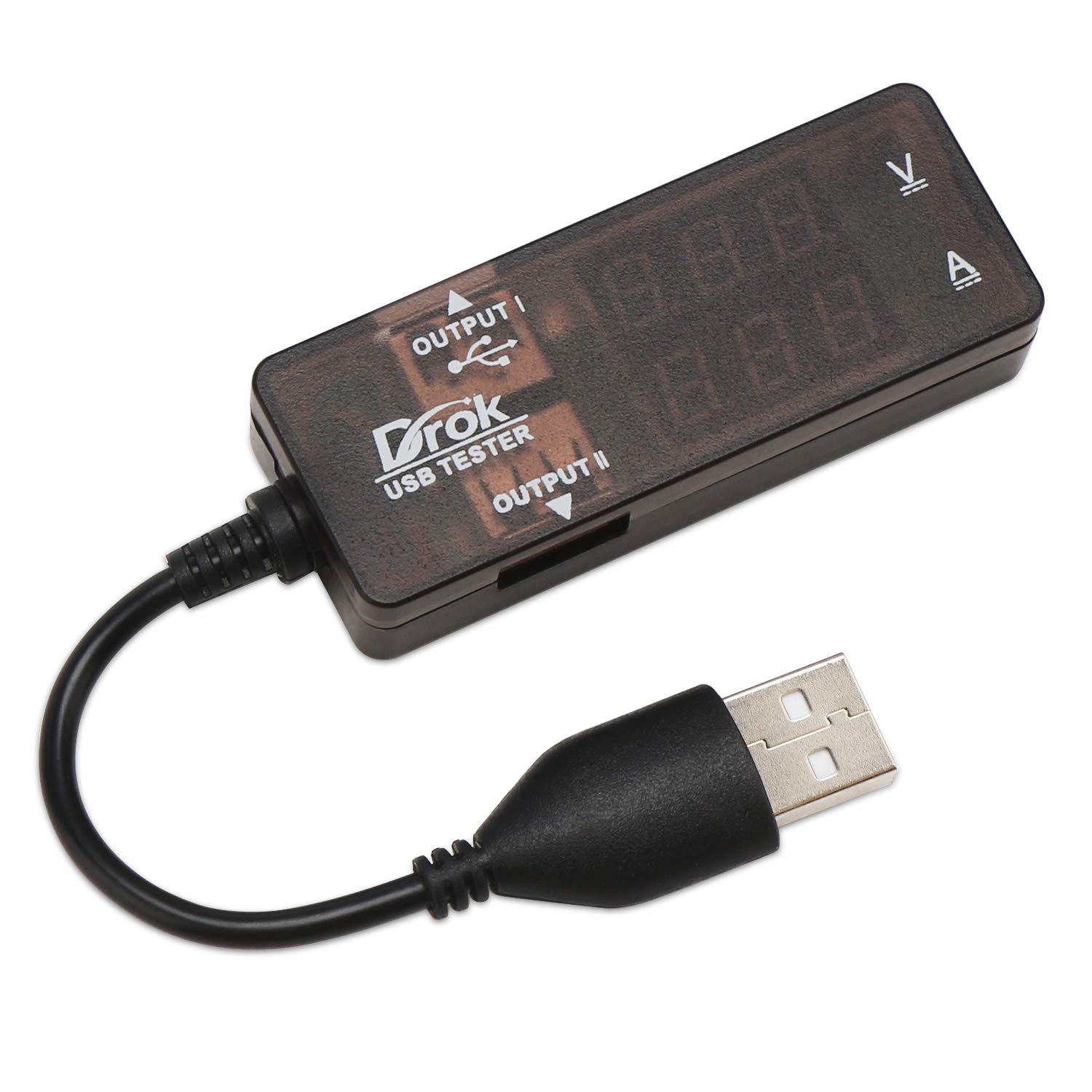
If USB C is what you desire then worry not. You can have a USB C tester as well with two outputs in this shape. If this product has existed you. Here is the link to further investigate it, Drok 300043 (Amazon link).
8. CT-3 USB Meter
Let’s talk about the USB tester that comes with PC software and with a feature customizable option. CT-3 from the AVHzy brand is a very power best USB tester with measuring options for both USB 3.1 and USB C.
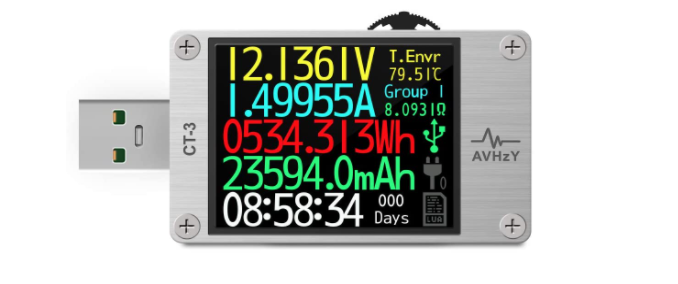
It has a very beautiful bright display with big bold readings. The colors are amazing and carefully chosen for specific parameters. Here is the link to know more exciting stuff about this meter, CT-3 (Amazon link).
9. RD TC64 USB meter
TC64 is another amazing USB tester that you can use for USB type C ports and cables. The amazing part of this tester is its high-definition display.
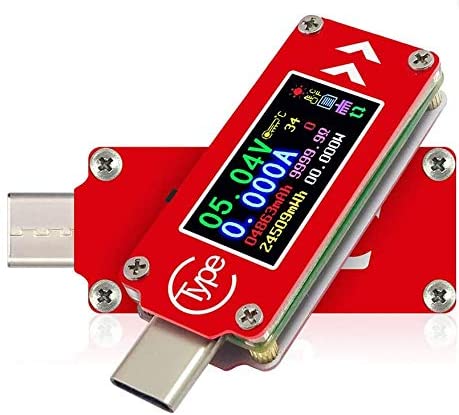
Important features:
- Voltage range of 3.7-30V
- The current range of 0-4A
- Fantastic resolution of 0.001V and 0.0001A
- The refresh rate of 2 Hz
Here is the link for this product to have a look yourself, tc64 USB tester (Amazon link).
10. MakerHawk USB C tester
As I share earlier USC C is the future of USB ports. And that’s why every USB tester is moving towards this technology. MakerHack has done a great job of providing us with their amazing UCB C tester.
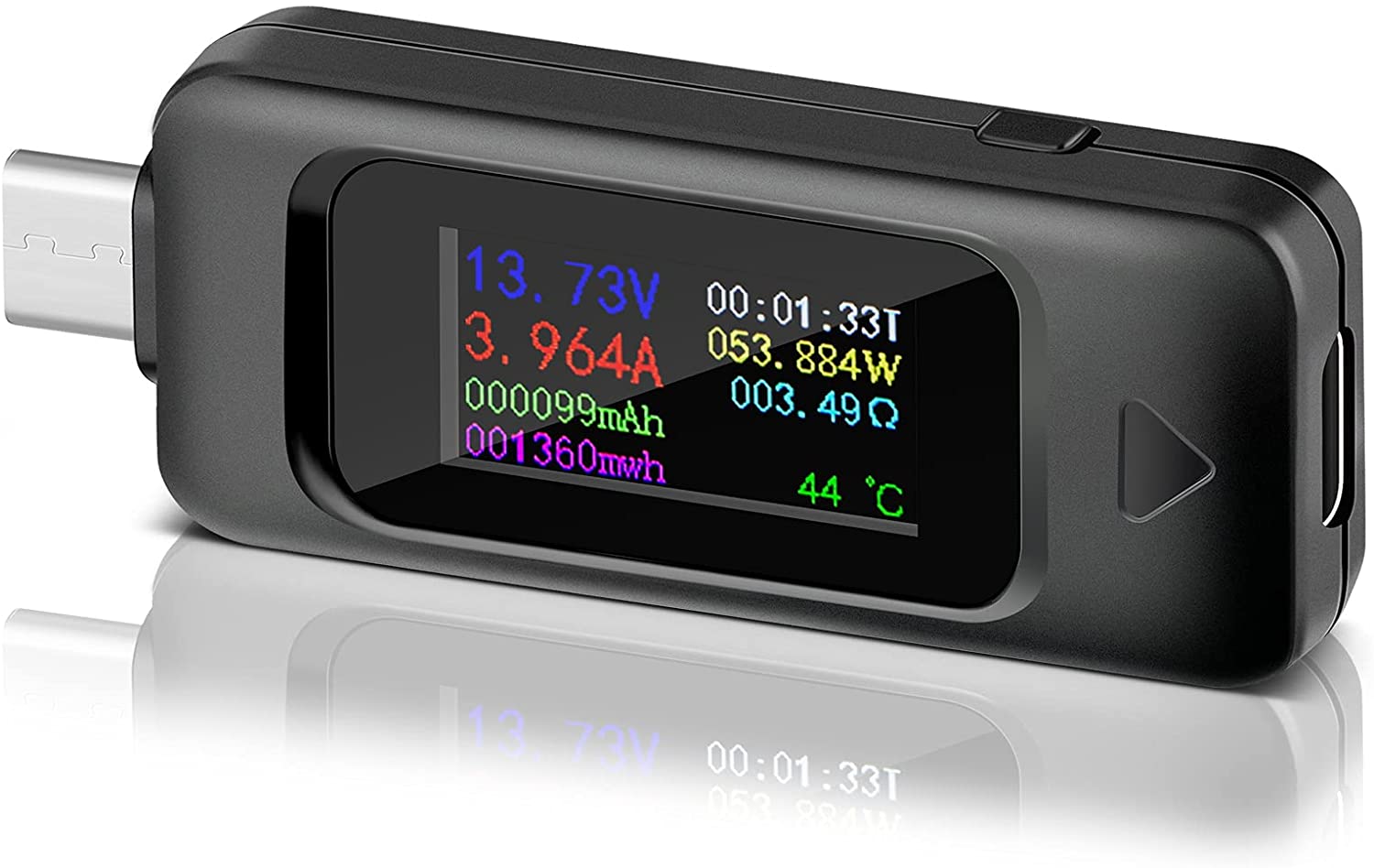
Important Features:
- Robust interface
- Sensitive touch, (built-in aluminum alloy plate, anti-friction, and anti-rust for repeated use)
- Type-C interface is fully reinforced
- Internal use of a professional instrument sampling circuit, coupled with a unique precision algorithm, ensures the accuracy and stability of the product at the hardware and software level
Follow the link to learn more about this exciting tester, MakerHawk (Amazon Link).
11. Flight-Sky USB meter
Flight-Sky is another popular brand in the electronics field. The USB tester from this brand is very simple and easy to use with the current flow arrow indicator.
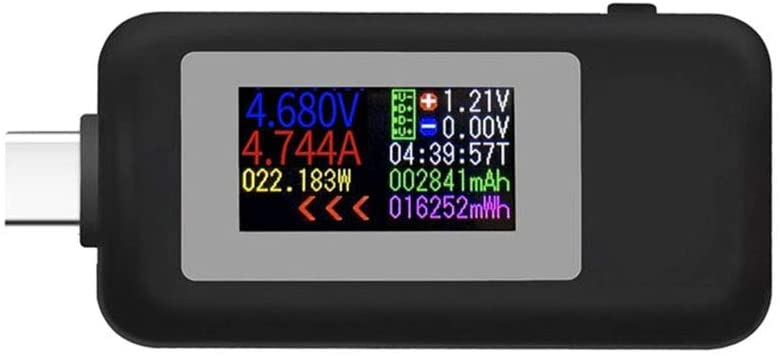
Important features:
- Bright and intuitive OLED display
- Measures current, voltage, and watt as well as what direction that received by your USB C Device without interrupting operation by Pass-Through charging.
- Monitor your power to ensure your devices is receiving adequate and safe charging
If this simple USB current tester has got your attention and you want to know more about it. Then, follow this link, Flight-Sky tester (Amazon link).
Is there any alternative available?
Of course, there are a lot of other models out there. You can search and talk to people if you are not sure. Just don’t buy a crapy product only because of the low price tag or fancy finishing.
What is a USB tester/multimeter?
As the name suggests, a USB tester is a tool by which we can test the USB port. It is used to check the voltage across the port, and monitor the current when a load is connected to it.
It also gives you power, capacity, and resistance measurements as well. So, if your USB port is behaving bitchy, and you don’t know why this guy can tell you what’s going wrong with your port.
How to use a USB tester/meter
Using a USB meter or tester is very easy. Though each model might have slightly different features, I am sure you will be able to crack that by playing a little with the device.
I don’t know but when you get an electronics device in your hand and just play with it for a while, automatically you figure it out how to use the device in a proper way.
Alright!
So, let me share the general method of how you can use a USB meter for testing and other stuff. Follow the following steps.
- First, carefully observe the ports and figure out which side is the input and which one is the output
- Usually, the input and output ports are mentioned
- Plug the input port into the port you want to monitor or test.
- After plugging the device will be turned On automatically
- The first parameter you must notice is the voltage, because the current is shown when you connect the load.
- When you connect the load i.e. your mobile or whatever, you will be able to see every parameter on the screen
This way you can use any tester for your measurements. There will be extra features like reading storing, and reset options. But I am sure you will figure out all those things yourself very easily.
Testing USB ports using a USB tester
After connecting the load and following the above-mentioned steps. The best way to check if the port is working fine or not is by following the below steps.
- See if the voltage showing on the display of the USB meter is what you were expecting it to be.
- Usually, USB ports have 5V across them, see if it is the case.
- If the voltage is not what it should be, then your port has a problem
Final words on best USB testers
There are many ways you can check the voltage across the USB port, and the current through it, and by producing these two parameters to get power.
You can use a simple multimeter to accomplish the above task. But wait, what if I tell you there is a dedicated USB multimeter for that. You wouldn’t believe me.
Trust me there is a USB multimeter, called a USB digital tester, a USB meter, USB power meter. It doesn’t matter what you call it, the point is using the best USB tester you can monitor your ports, test, and check for the faulty ones.
This article is all about testing USB ports by a tester. There presented a recommended list using which you can buy the one for you.
I wrote this conclusion for the people who start from the conclusion and then decide to read the entire article. If you are that guy, now you can read the article. If you are the guy making it this far, thank you for the time.
I hope this article kinda helped you.
Other useful posts:
- Spectrum analyzers for beginners [How to select the best]
- Best oscilloscopes for beginners (An easy buying guide)
- 20 Best soldering station [beginners to professionals]
- Measure USB current and voltage (Practical Solutions)
- USB Cable testing (How to check a bad USB cable)
Thank you and have a good life.

Dear Abbas, please could you clarify which of usb testers could be used to measure power consumption of USB 3.2 Super Speed devices (Gen 1, Gen 2, Gen 2×2)? I mean which of “usb testers” provides pass-through data transfer for USB 3 devices like Flash drives, external HDD, SSD etc? Preferably communication line pass-through for Type-A ports, without any interference.
Didn’t see any USB testers, only voltmeters, and I already have a DMM. Does anyone make a real USB tester? That is one that will send and receive a message and perhaps measure timing constraints? I’m not at all interested in the voltage or current present on the USB port.
Only half the problem is addressed. Yeah, any old DMM can check voltage and current. I don’t care about those. I want to know if data can be passed back and forth in both directions. Forget testing voltage and current. The most junior tech can check those with almost any lab meter or scope.